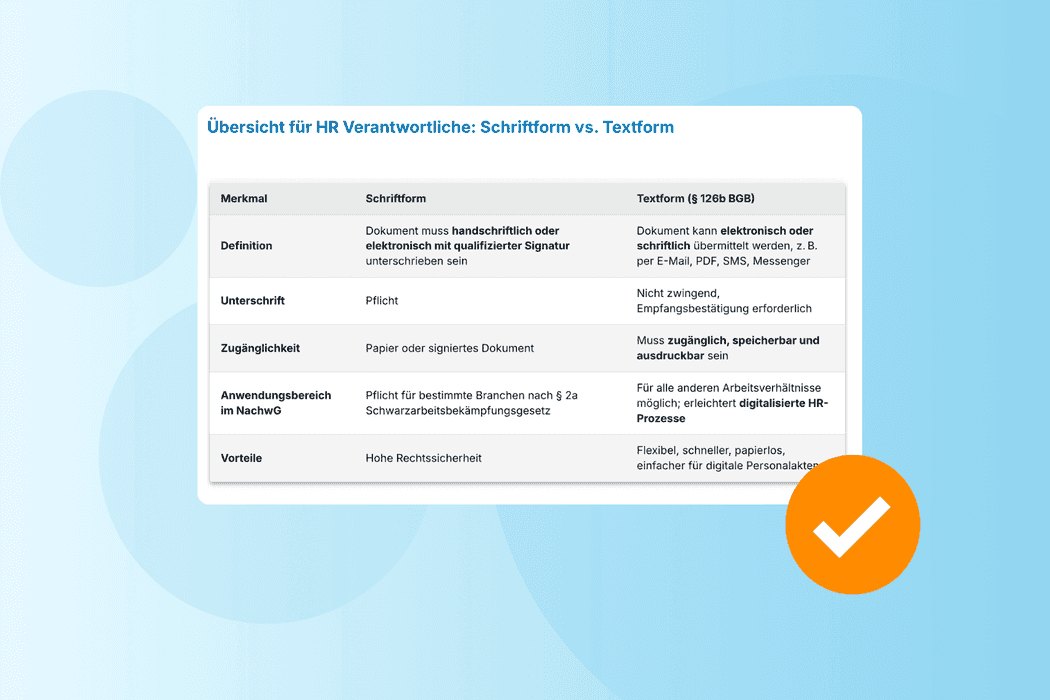Changes in the Employment Confirmation Act
A new Employment Confirmation Act came into effect on August 1 of this year, requiring employers to provide more information when hiring new employees than was previously necessary.

Previous Employment Confirmation Act
Up to now, the Employment Confirmation Act required employers to provide the following information in writing to their employees within one month of the start of employment:
- Name and address of the contracting parties.
- The start date of the employment relationship.
- For fixed-term employment relationships: the end date or the foreseeable duration of the employment relationship.
- The place of work or, if the employee is not restricted to a specific workplace, a reference that the employee may work at various locations or choose their place of work freely.
- A brief characterization or description of the tasks to be performed by the employee.
- The duration of annual paid leave.
- Notice periods.
- A general reference to collective agreements, works agreements, and service agreements concerning the employment relationship.
What Changes Does the New Employment Confirmation Act Introduce?
Since August 1 of 2023, new hiring regulations are in place. The parties must have a record of the listed points from the first day of employment at the latest — within seven calendar days, to be precise. It's important to note that, regarding all other confirmations, seven days remain the deadline. It's essential to be aware that violations can result in fines of up to €2,000 per person.
Additional Points According to the Amendment to the Employment Confirmation Act
- If agreed upon, the duration of the probationary period.
- The end date of the employment relationship.
- If applicable, the employee's freedom to choose their workplace.
- The composition and amount of the compensation for work, including overtime pay, surcharges, allowances, bonuses, and special payments, each to be separately stated, as well as their due dates and method of payment.
- The agreed working hours, agreed rest breaks and rest periods, and, in the case of shift work, the shift system, the cycle of shifts, and the conditions for changing shifts.
- If agreed upon, the option for overtime work and its conditions.
- Any entitlement to employer-provided further training.
- If the employer promises the employee a company pension plan through a pension provider, the name and address of that pension provider; the obligation to confirm this information is waived if the pension provider is obligated to provide this information.
- The procedure to be followed in the event of termination of the employment relationship by the employer and the employee, at least the requirement of written form and the deadlines for termination of the employment relationship, and the time limit for bringing an action to contest the termination of the employment relationship; section 7 of the Employment Protection Act applies in the case of an improper confirmation of the time limit for bringing an action to contest the termination of the employment relationship.
In Practice
In keeping with German habits, this new requirement is subject to written form. For small and medium-sized enterprises, this represents a considerable additional workload given their limited resources. The threat of a significant fine makes the implementation simultaneously stressful.
Therefore, it is important to consider the implementation from two perspectives. Firstly, all sample contracts for new hires should be uniformly supplemented with the new information. This not only facilitates the implementation for individual cases but also serves as guidance for all employees who were already part of the company.
For these cases, it is essential to identify which groups of employees can be served with a standard letter incorporating the additional information. Naturally, there must be substantial overlap in the working conditions of each group. At the same time, your HR departments should be prepared for inquiries and be well-trained with a good understanding of the matter.
If you have works councils, it also makes sense to consider including additions to general employment conditions such as working hours, company pension schemes, etc., in the agreements. Employment contracts can then refer to this.
Disclaimer
We would like to point out that our website provides non-binding information, which under no circumstances constitutes legal advice. This also, and especially, applies to topics within the sphere of legal HR advise. The content of this contribution cannot and is not intended to replace individual and binding legal advice. For this reason, all information provided is without guarantee of correctness and completeness, but always researched with the utmost care.